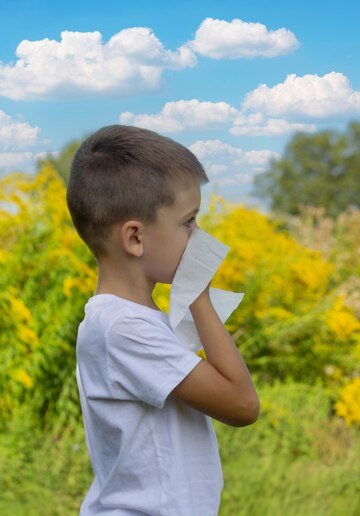ALLERGIES

Understanding Allergies
Allergies are a common health concern affecting millions of people worldwide. Whether it’s a seasonal sniffle or a reaction to certain foods, allergies can range from mild discomfort to severe, life-threatening conditions. In this blog, we’ll explore what allergies are, what causes them, how they can be treated, and some natural approaches, including homeopathic remedies, to managing allergies.
What Are Allergies?
Allergies occur when the immune system overreacts to substances (known as allergens) that are generally harmless to most people. These allergens can include pollen, dust mites, pet dander, certain foods, and insect stings. When an allergic person is exposed to an allergen, their immune system perceives it as a threat and releases chemicals like histamines, which cause the symptoms of an allergic reaction.
What Causes Allergies?
Allergies are caused by a hypersensitive immune response to allergens. Several factors can contribute to the development of allergies, including:
- Genetics: If you have a family history of allergies, you’re more likely to develop them.
- Environmental Factors: Exposure to allergens like pollen, pollution, or chemicals can trigger an allergic response.
- Diet and Lifestyle: Food allergies can develop over time, and lifestyle factors like smoking or stress may increase sensitivity to allergens.
- Immune System Imbalance: A weakened immune system can sometimes react more aggressively to substances that would otherwise be tolerated.
Common allergens include:
- Pollen: A leading cause of hay fever and seasonal allergies.
- Dust mites and mold: Found in many homes, they can lead to respiratory issues.
- Animal dander: Proteins in the skin, saliva, or urine of animals can trigger allergies.
- Foods: Common culprits are peanuts, shellfish, dairy, and eggs.
- Insect stings: Bees, wasps, and other insects can cause severe allergic reactions.
How Can Allergies Be Treated?
Finding the root cause of allergy is important.
Epinephrine (for severe allergies): Severe allergic reactions like anaphylaxis can be life-threatening. In such cases, an epinephrine injection (EpiPen) is used to prevent anaphylactic shock.
Precautions to Take if You Have Allergies
Managing allergies requires some precautionary steps to minimize exposure to allergens and reduce the severity of reactions. Here are a few precautions you can take:
- Limit Outdoor Exposure During Allergy Season: For seasonal allergies, check pollen counts and try to stay indoors during peak pollen hours (early morning and evening). Keeping windows closed can also help prevent allergens from entering your home.
- Clean Your Living Environment: Regularly vacuum and dust to reduce indoor allergens like dust mites, mold, and pet dander. Use air purifiers to clean the air in your home.
- Allergen-Proof Bedding: Consider using allergen-proof pillowcases and mattress covers to minimize dust mites’ exposure.
- Watch Your Diet: If you have food allergies, read food labels carefully to avoid triggering substances. When dining out, inform the restaurant staff about your allergy.
- Avoid Triggers: For animal allergies, limit your exposure to pets or opt for hypoallergenic breeds.
Homeopathic Medicines for Allergies
- Allium Cepa: Useful for allergic rhinitis (hay fever), this remedy addresses symptoms like watery eyes, sneezing, and a runny nose, particularly when the discharge is watery and causes burning.
- Euphrasia (Eyebright): Effective for treating eye-related allergy symptoms, such as itching, burning, and watering eyes, often accompanied by light sensitivity.
- Sabadilla: Recommended for sneezing and runny noses caused by hay fever, especially if symptoms worsen when exposed to flowers or pollen.
- Arsenicum Album: Helpful for allergies associated with asthma-like symptoms such as wheezing, shortness of breath, or anxiety.
- Nux Vomica: Often recommended when allergies are triggered by environmental pollutants, dust, or chemical exposure, leading to symptoms like congestion and headaches.
- Natrum Muriaticum: Typically prescribed for allergic reactions to pollen or dust, especially when the person experiences a blocked nose, loss of smell, or dry, cracked lips.
- Histaminum: For hay fever, allergic rhinitis, sneezing, nasal discharge and watery eyes. For dust, pollen or mould allergies.
Conclusion
Allergies are a widespread condition, but with proper management, they can be controlled, allowing individuals to lead healthy, comfortable lives. It’s also essential to take precautions and be aware of your triggers to avoid exacerbating allergic reactions.
Understanding the causes and treatment of allergies empowers you to manage them effectively and live your life with fewer interruptions from these irritating reactions.
If you are struggling with allergies or hay fever symptoms and finding it to find the right remedy that fits your symptoms BOOK A CONSULT OR FREE DISCOVERY CALL
